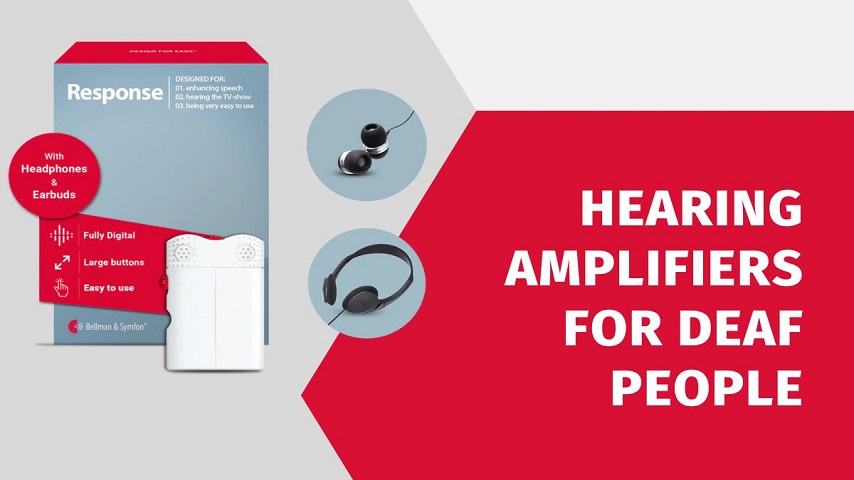Hearing Amplifiers: Your Guide to Better Hearing Clarity
You're not alone if you've ever found yourself straining to catch conversations or missing out on subtle sounds. For millions, hearing amplifiers provide a practical solution to enhance everyday hearing. But what exactly are hearing amplifiers, and how do they compare to traditional hearing aids or amplified hearing devices? Let's dive in and explore these life-changing tools in detail.
What Are Hearing Amplifiers?
Hearing amplifiers, often called personal sound amplification products (PSAPs), are small electronic devices designed to amplify surrounding sounds. They help individuals with mild to moderate hearing challenges by making environmental sounds louder and more transparent.
Unlike hearing aids, which are medically prescribed, hearing amplifiers are over-the-counter devices aimed at enhancing hearing in specific situations, such as watching TV, attending meetings, or enjoying nature.
How Do Hearing Amplifiers Work?
Hearing amplifiers function by:
- Capturing Sound: A microphone picks up ambient sounds.
- Processing Audio: The device amplifies and filters the sounds to enhance clarity.
- Delivering Output: A speaker delivers The processed sound to the ear.
These steps ensure that users can hear soft sounds more distinctly, making conversations and environmental noises more accessible.
Key Features of Hearing Amplifiers
When shopping for a hearing amplifier, you'll notice several standard features:
Adjustable Volume Levels
Most hearing amplifiers allow users to control the volume, ensuring personalized hearing support in various environments.
Noise Reduction
Advanced models come with noise-canceling technology, which filters out background noise for more transparent conversations.
Rechargeable Batteries
Modern hearing amplifiers often feature rechargeable batteries, reducing the hassle of frequent replacements.
Compact Design
These devices are typically small and lightweight, making them discreet and comfortable for prolonged use.
Directional Microphones
Some hearing amplifiers include directional microphones to focus on sounds from specific directions, such as a person speaking in front of you.
Types of Hearing Amplifiers
Behind-the-ear (BTE) Amplifiers
- Fit comfortably behind the ear.
- Suitable for extended wear.
- Offer larger battery capacity and more features.
In-the-Ear (ITE) Amplifiers
- Fit inside the ear canal.
- Discreet and lightweight.
- It is ideal for individuals seeking a less noticeable device.
Pocket Hearing Amplifiers
- Consists of a small unit connected to earbuds.
- Provide high power output.
- Suitable for severe hearing challenges.
Popular LSI Keywords: Amplified Hearing Devices
Amplified hearing devices are a broader term encompassing various sound-enhancing tools. These devices include not only hearing amplifiers but also specialized gadgets like:
- TV Listening Devices
- Amplify TV audio without disturbing others.
- Often comes with wireless connectivity.
- Telephone Amplifiers
- Enhance clarity during phone conversations.
- It is beneficial for individuals with moderate hearing difficulties.
- Personal Amplification Systems
- Ideal for classrooms or large venues.
- Use microphones and receivers to deliver enhanced sound directly to the user.
Advantages of Using Hearing Amplifiers
- Affordability: Hearing amplifiers are budget-friendly compared to medical hearing aids.
- Ease of Use: Most devices are user-friendly, requiring minimal setup.
- Immediate Availability: No prescription or fitting appointments are necessary.
- Enhanced Situational Hearing: Perfect for specific scenarios like birdwatching, attending lectures, or enjoying a play.
- Portability: Compact designs make them convenient to carry and use on the go.
You can visit and choose hearing amplifiers and buy at shop.bellman.com
Limitations to Consider
While hearing amplifiers are incredibly useful, they're not without drawbacks:
- Not a Medical Solution: They don't only amplify sounds and treat hearing loss.
- Limited Customization: Unlike hearing aids, they lack tailored settings for specific hearing profiles.
- Potential Feedback: Some models may produce unwanted feedback or distortion in specific environments.
Tips for Choosing the Best Hearing Amplifier
When selecting a hearing amplifier, keep the following in mind:
- Assess Your Needs: Determine the situations where you need sound enhancement most.
- Look for Comfort: Choose a model that fits comfortably for prolonged use.
- Check for Noise Reduction: Opt for devices with advanced noise-canceling features.
- Battery Life: Consider whether rechargeable or disposable batteries suit your lifestyle.
- Read Reviews: User feedback can provide valuable insights into a product's performance and durability.
Frequently Asked Questions About Hearing Amplifiers
Q: Are hearing amplifiers suitable for everyone?
A: Hearing amplifiers are best for individuals with mild to moderate hearing challenges. Those with severe hearing loss should consult a healthcare professional for hearing aids.
Q: Can hearing amplifiers damage hearing?
A: Hearing amplifiers are safe when used correctly. However, excessively high volume levels can cause harm.
Q: Are there any maintenance requirements?
A: Regular cleaning of the device and replacing ear tips ensures optimal performance.
The Future of Hearing Amplifiers
Advancements in technology continue to improve hearing amplifiers. Future models are expected to offer:
- AI Integration: Enhanced sound processing for more transparent audio.
- Smartphone Connectivity: Seamless control via dedicated apps.
- Improved Aesthetics: Sleeker and more discreet designs.
- Better Battery Performance: Extended life for all-day use.
Final Thoughts
Hearing amplifiers, hearing aid amplifiers, and amplified hearing devices have revolutionized how individuals manage mild to moderate hearing challenges. Affordable, easy to use, and versatile, these devices are valuable for anyone looking to enhance their hearing in specific situations.
While they're not substitutes for medical hearing aids, hearing amplifiers bridge the gap between unaided hearing and full auditory support. Whether attending a meeting, enjoying a family gathering, or watching TV, these devices ensure you never miss out on the sounds that matter most.
If you're considering a hearing amplifier, take the time to assess your needs and explore the available options. With the right device, you can embrace a more transparent, more connected world.





Comments